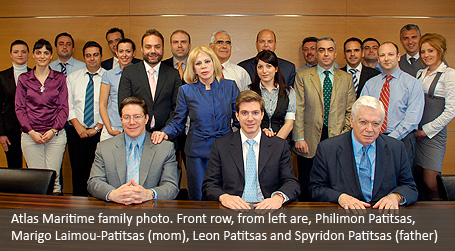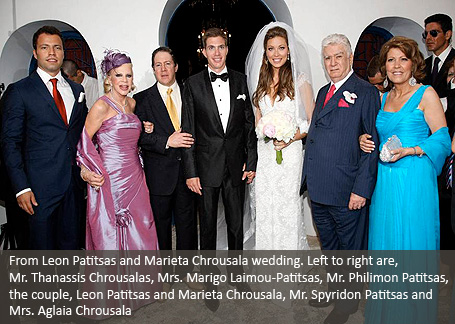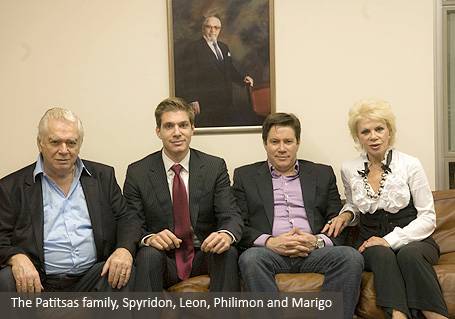After visiting them at their company’s headquarters, I was amazed and touched at the same time how two young, successful and intelligent businessmen consider family values so important, admitting that we could go on living with the bare essentials, when our heart is full of pure, genuine and real love.
By Margarita Vartholomeou
I left the office of Atlas Maritime that afternoon very satisfied and touched. Both Leon and Philimon Patitsas as well as Mrs Marigo Laimou-Patitsa and her husband were very welcoming and hospitable. Living in a money-driven society, in times of corruption, it is really encouraging to find these two young successful businessmen with solid character, high educational and social standards, cohesion, clarity and integrity.

Leon Patitsas founded Atlas Maritime in 2004, and since then, the company has significantly. Today Atlas owns a fleet of 6 modern Aframax tankers, built in the world’s best shipyards. Mr. Patitsas, Atlas’ CEO, made some astute decisions by selling the bulk carriers and the VLGC at very good levels, and by securing time charters for the majority of the fleet. From 2000 to 2004, he was the Principal of Strength Shipping, and under his leadership he renewed the fleet and established a more corporate culture, promoted safety and environmental awareness and made the business more efficient and cost effective. Prior to that, he worked for UBP, a Swiss bank based in New York, and was on the team that invested the bank assets into hedge funds. Leon Patitsas is a member on the Board of Directors of the Union of Greek Ship Owners. He was born in London and he is a British citizen.
Philimon Patitsas has studied Economics and Philosophy in Boston. He founded an information technology company at a young age, with the aim to introduce computer networks and systems in shipping management and ships. He has over 20 years experience in Shipping and he served as a deck officer on board a vessel. Phil, as friends call him, has traveled extensively around the world and he has supervised the construction of many new ships in South Korea (Hyundai) and Japan. He is responsible of identifying investment opportunities, developing new relationships with shipyards, charterers, and financial institutions and also for nurturing existing relationships with long-standing industry contacts.
What are the prospects for the Greek economy? How serious is the situation and how is it going to affect the maritime industry, since Greece has the largest fleet in the world?
Philimon Patitsas: The situation is quite serious. Of course we all have to agree that the European Union along with the IMF will support Greece in order to help stabilize the crisis that we are going through at the moment. We are optimistic about Greece due to the fact that we have been through wars and many crisis several times in the past and effective solutions have been given. Now it is a great opportunity for Greece to reform itself completely. It might also be a wake up call for everybody here in Greece to change this mentality of corruption in the public sector and generally speaking at all levels of our lives. Also, productivity can and should be increased. This is also a great opportunity for politicians to revise their ideas and make Greece a competitive place for investors to invest like Singapore for example, while trying to utilize the Greece’s young work force that is well educated and willing to work hard in order to improve the financial status of the country.
Luckily, the maritime industry will not be greatly affected. We believe that the Greek shipping has built one of the strongest forces in the world due to the fact that the government has not interfered a lot and also because it is an international business and the counterparts are usually international companies and investors. Consequently the premier spirit has been flourished because it has not been regulated by the Greek government. The solution is also in incentives.
You studied and you also worked in the US and yet you left and went back to Greece. Are you happy with that decision?
Leon Patitsas: I was born in 1976, in London, and came to Greece when I was six months old. I grew up in Greece, attended Moraitis High School after I went to Campion from where I graduated in 1993. After that, I went to Tufts where I studied Mechanical Engineer, I sailed in a vessel for six months and got to know the shipping world from a closer distance. It was that time when I realized the difficulties people faced by working too far from their families, their country of origin, their friends, generally speaking their loved ones. It was that time when I realized these people were deprived of the simple pleasures of life, they are confined and they have to work too hard in order to earn their own living. Then I appreciated more what I have in life and I became more grateful to God for that. These circumstances also gave me the incentive to try harder in order to do things on my own since I was given the chance to have a better life. Later,I went to New York and worked for UBP in the Rockefeller Center. After I returned back to Greece, with the help of my family we formed Atlas Maritime, the old company of our grandfather captain Leon Laimos and in 2000 we bought some more vessels such as bulk carriers and gradually started growing the company buying tankers as well. In 2007 we took the strategic decision to sell dry bulks, because we thought that it would be also good for us. We are very optimistic about the future and we would like to grow further.
Do you miss America? What are the moments that you become more nostalgic about?
Philimon Patitsas: As a graduate of MIT, I am very ambitious. I adore the culture and the fast way things can be done in the United States. It is also a country of opportunities, which enables you to develop. If you go there with nothing and you are determined to work hard and you are really worth it and accomplish things - you will succeed. This is a great incentive for people. That is also the reason why people work harder in the U.S they are professional, productive, disciplined, with methodology and determination. The rest of the world is trying to copy the management practices in America in order to develop the same particular platform, the exact opposite with Greece, where there is too much prejudice and not meritocracy and you have to be the “cousin of the cousin” of particular people, in order to go ahead with your career. Here in Greece, we also have to concentrate on educating the people not only the bare knowledge, but socially as well in order to behave better. And the most important, is to convict all the people, who are corrupted and steal and send them to jail, even the politicians, if we have to. In the U.S. there are rules and regulations. Yes, indeed I miss America a lot and I am very nostalgic about it.
Are you going back to the US often?
Leon Patitsas: We visit the U.S frequently, 4-5 times a year - our tankers are based there. We have an uncle there who has six children and has a wonderful family. I say that you have to stay where your love is. If your love is here, you have to stay here. The love of your life gives you always the motive to achieve higher goals and accomplish things. But the truth is that the love of your life follows you everywhere you go. Anyway, for the time being, we will stay here.
Do you plan to expand to the US?
Philimon Patitsas: Like we said before, we go to the U.S. quite often. We have our tankers there. New York is the financial capital of the world and the place to be, we might consider to go there one day. The situation in Greece is peculiar. There are a lot of demonstrations, the government has taken severe measures, people are complaining, petrol costs, lower income, high taxes, we do not know what might happen. It is always good to keep our options open.
What do you think of the state of the American economy? What's the feedback you get from home and what was your personal assessment last time you were here?
Leon Patitsas: They have to take action fast. President Obama has to adopt fiscal and monetary policies and packages that would save the public. There are a lot of reforms needed in the financial sector. The government is trying to correct mistakes from the past. We are certain that catharsis will come and scandals will be diminished. The U.S. economy is on the right track.

This past summer you got married not only to a very beautiful woman, but also one of the hottest TV personalities in Greece. Tell us how you met your wife and what are your future plans?
Leon Patitsas: I met Marieta in Zappion and after a couple of months we met again at a party. I fell in love with her, not only her beauty, but also her character, mind and personality as well. She is logical, smart and has a great sense of humor. She is serious, sweet and a very nice person. We would like to have a family and children. At the end of the day, the most important of all is that whatever we are building in Atlas, we have a vision to create a legacy and the vision is one day to pass on this legacy to the next generation. Family and traditions are very important to us. My dream is to have my own children, or my grandchildren, manage to build a strong relationship with all of them, and to tell them that this is our tradition, our legacy, this is what we created, and to give them incentives to go ahead and continue. It is very crucial to diffuse this passion from one generation to another.
Do you visit Lefkada often? Did you take your wife there?
Leon Patitsas: Lefkada is our dearest place. Our father is from there and we have been there quite a few times, especially to Porto Katsiki with Marieta. Windsurfing in Vasiliki, doing several water sports, snorkeling, hiking and swimming in the waterfalls is just a few of the things we enjoy there. Yes, we like the place a lot. Also our mother's place is Oinousses, where our grandfather Leon Laimos was born. We also like this place a lot. And as you may realize we come from the western side as well as the eastern side of Greece.

What message would you send to our fellow Greek-Americans?
Philimon Patitsas: For me it is very important and I would recommend to those, who have families there and raise children, to teach them to speak Greek and to keep their traditions, the Greek-Orthodox religion, to maintain the Greek identity, the dances, the Greek anxious spirit, culture, food etc. I would also suggest to speak to their children about the Greek philosophers, teach them to respect others, and try to bring them to Greece every summer and expose them to the Greek culture, because they have to get close to their roots, not because we want their money to be invested here, but due to the fact that it is crucial for all of us not to lose our Greek identity. I am sure that there are many, but I know an American-Greek, Mr. Maurice Gritzalis, who is the SAE of America Youth President. He is very young but he is doing great work for all the Diaspora.
Dimitri Soultogiannis contributed to this interview.